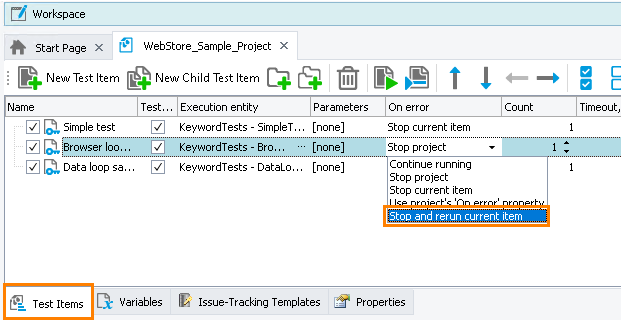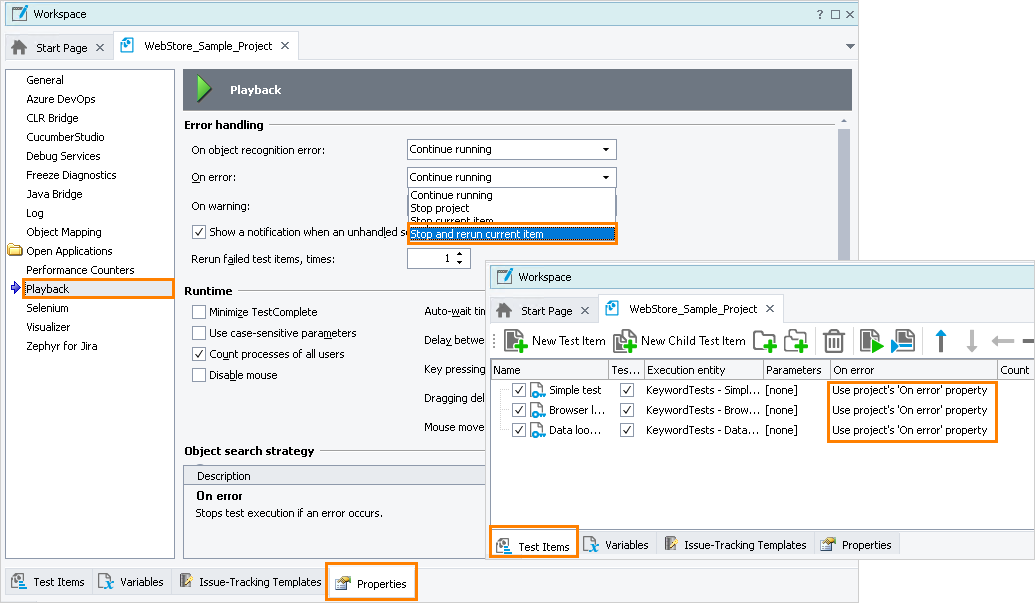This topic describes the changes made to TestComplete 14.71. For information on the changes made to other versions of the product, see Version History.
In version 14.71
Rerun failed test items
An error in the test log does not always mean an error in the tested application. Tests can fail for various reasons: environmental issues, malfunction of third-party services, system delays, and so on. You may want to re-run a failed test to exclude unexpected factors when deciding if a test has passed or not. TestComplete includes new settings that help you easily re-run failed tests:
-
The test item On error setting has a new value – Stop and rerun current item. Select it if you want the test run to re-run on error automatically:
-
You can also define similar behavior for all the test items of your project. To do this, select the new Stop and rerun current item value in the Playback > On error project property, and then for the test item, select Use the project's On Error property:
-
To specify the number of re-run attempts, use the new Playback > Rerun failed test items property of your project.
See Stop and Rerun the Current Test Item After an Error for all the details.
Set project variables from the command line
If you run your tests from the command line, you can use the new -pv:variable=value and -psv:variable=value command-line parameters to specify the values of project and project suite variables, for example:
REM Setting a project variable
TestComplete.exe "C:/My Tests/Project1.mds" -run -pv:browser=Chrome
REM Setting a project suite variable
TestComplete.exe "C:/My Tests/ProjectSuite1.pjs" -run -psv:userName=john.smith -psv:passwordVar=abc123
Previous versions of TestComplete supported parsing arbitrary parameters to the test runner, but the new approach takes a step forward in this direction: it frees you from writing code for parsing the command line. The new options apply to all the test runners and utilities: TestComplete, TestExecute, SessionCreator.
See Passing Variables via Command Line for complete information.
Improvements in cross-platform web testing
-
You can now run concurrent cross-platform web tests easier. Both trial and commercial licenses of TestComplete now include the Device Cloud Parallel trial license. The TestComplete installation package includes the TestExecute Lite modules that are needed to run tests in parallel. The utility is installed automatically with TestComplete, and you do not need to install it manually. All this means that if you are interested in trying to run your cross-platform web tests in parallel, you can now do it right away!
-
Use project variables in XPath expressions and CSS selectors to map tested web objects. This helps you create more flexible and easily configurable mapping names. See XPath Expressions and CSS Selectors.
-
Use the new
FindElements(…)scripting method to find tested web objects on the screen. Previous versions of TestComplete had theFindElement(…)method that returned only one found object. The new method returns an array that has all the objects matching the search criteria. The new method applies both to thePageobject and to the test objects that match individual web elements.
Web testing improvements
-
New supported browser versions:
- Firefox 83
- Chrome 86
-
Support for applications created with Chromium Embedded Framework (CEF) version 85.0.4183.
Note: This doesn’t apply to CEF applications that use WPF controls. For these applications, the supported CEF versions are 84.0.4147 and earlier.
Mobile testing improvements
-
Support for iOS 14.1. You can now create and run automated tests on this new version of iOS.
More
-
UX improvements: we’ve reorganized items on the main toolbar and made some infrequently-used items hidden by default.
-
We have improved the installer of the Licensing manager utility. Now it runs significantly faster.
-
The Additional info parameter of keyword-test operations that relate to logging has been renamed Details.
-
We’ve also fixed a few issues reported by our customers.
Discontinued support
-
We’ve excluded legacy modules that provided support for Subversion (SVN) through the Microsoft Source Code Control API. That support existed in TestComplete 10.60 and earlier.
The newer Subversion support technology – the one that was introduced in TestComplete 11 and that works through TortoiseSVN – is still available and supported. See Integration With Subversion.

 Rerun failed test items
Rerun failed test items
